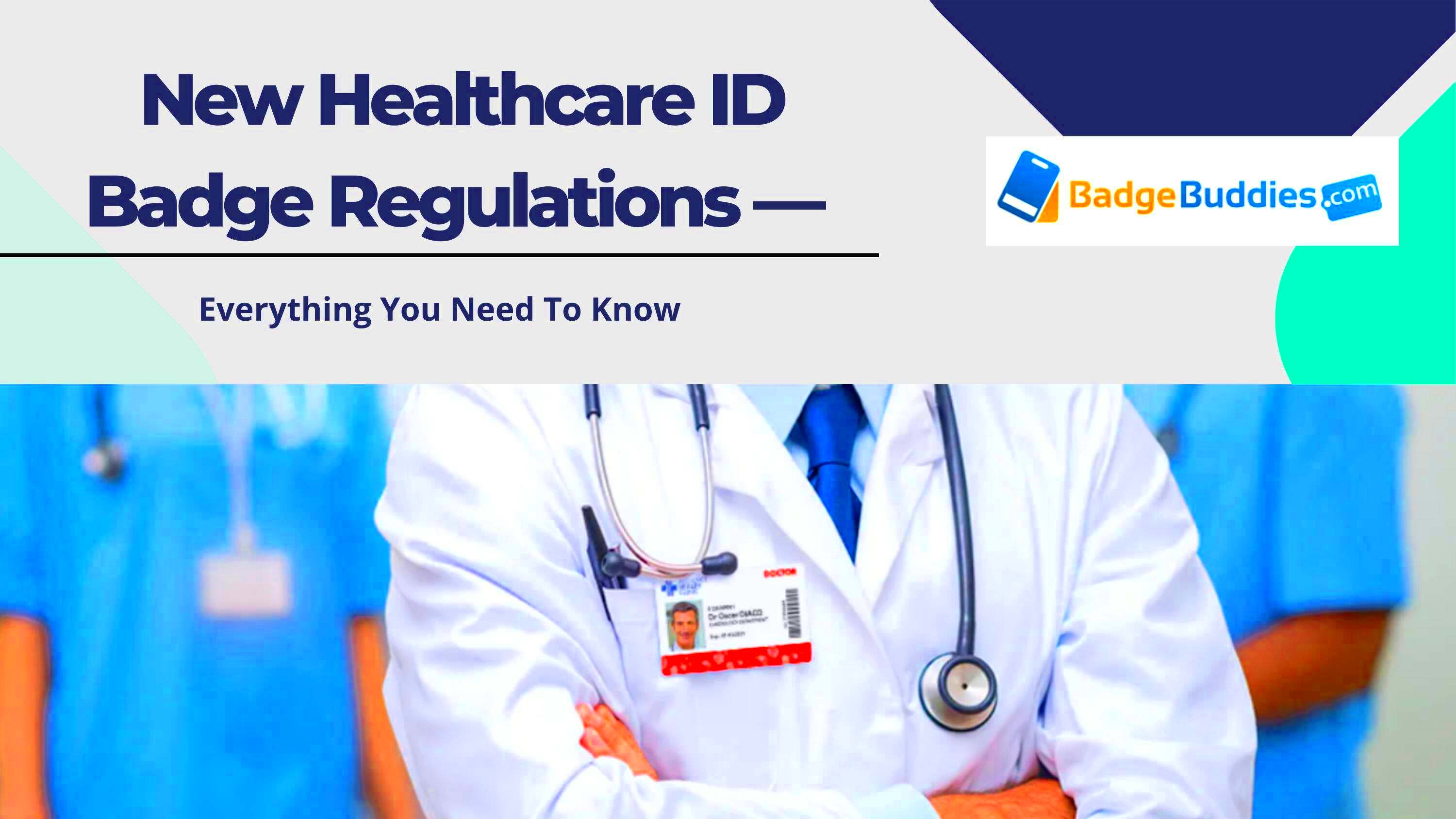Compliance Requirements for Healthcare ID Badge Laws
Laws regarding health care ID badges aim to guarantee clarity and safety inside hospitals. Usually, these regulations require medical service providers to wear their ID badges that include their name, picture and profession. Compliance with these laws is important for both health institutions and practitioners as it increases patients’ confidence on them thus ensuring answerability. It may be difficult to navigate such requirements but having basic knowledge can help smoothen some of its facets.
This blog post will delve into the importance of these badges, the main laws that govern them, and how health care centers may comply with such legislation.
Why Healthcare ID Badges Are Important

Hospitals and clinics have order, trust and security due to healthcare ID badges. Here are the reasons why they are essential:
- Patient Trust: When patients see a clearly visible ID badge, it gives them confidence that the person treating them is qualified and part of the healthcare team.
- Accountability: ID badges help in holding healthcare workers accountable by clearly displaying their name, title, and sometimes even their department.
- Security: By distinguishing healthcare staff from visitors, badges minimize the risk of unauthorized access to sensitive areas within a facility.
- Emergency Identification: In case of emergencies, badges allow quick identification of healthcare professionals, enabling prompt responses.
More than just fashion statements, these badges serve a greater purpose of ensuring that everybody concerned is kept safe within the healthcare environment.
Key Legal Regulations for Healthcare ID Badges
With respect to HCID badges, a number of regulations are in place that differ from one state or area to another. Here are some frequently mandated legal standards:
- Identification: Most regulations require the badge to display the employee’s full name, photograph, and role within the healthcare institution.
- Visible Wear: Badges must be worn in a visible manner at all times while on duty to ensure easy identification.
- State-Specific Laws: Some states, like California and Pennsylvania, have specific laws that require additional information such as the license status or credentials to be included on the badge.
- Privacy Considerations: Balancing patient and worker privacy is critical, and regulations often dictate that only necessary information be included on the badge to avoid violations of personal privacy.
Although the fundamental components of ID badge rules for healthcare remain diachronic, being aware of your state’s or facility’s explicit regulations will help you avoid being out of compliance.
State-Specific Compliance for Healthcare Badges
Authorities in different states can make their own laws regarding ID badges for healthcare workers aside from what is given at the federal level. Hence, there are challenges associated with adherence as something that is approved by one state can be prohibited by another. For example, California, Pennsylvania and Texas all have more conditions than other states no matter how big or small their healthcare facilities might be.
For instance, in California, healthcare workers are required to display their name, job title, and the type of license or certification they hold. Pennsylvania mandates similar requirements but also emphasizes badge visibility at all times while on duty. In contrast, some states may be more lenient, requiring only basic identification such as name and photo.
There are several important things about each individual state:
- California: Requires the inclusion of professional titles like “Registered Nurse” or “Licensed Physician.”
- Pennsylvania: Badges must clearly state the department and role of the healthcare worker, and the badge must always be visible.
- New York: ID badges must include the facility name and the healthcare worker’s role, and must comply with the Health Insurance Portability and Accountability Act (HIPAA) to protect patient data.
In line with full adherence, it is significant that healthcare facilities constantly examine unique rules from their states. Being current is crucial because these statutes might change due to emerging healthcare patterns as well as security challenges.
Penalties for Non-Compliance with Badge Requirements
An instance of violation of the law regarding healthcare ID badges has a variety of effects both personal and institutional to healthcare workers. Penalties differ on the sides of states or extent of breach committed. Disregard for these conditions can bring about loss of confidence from patients on nurses and doctors as well as huge legal and monetary issues.
Disregarding regulations can bring about following results:
- Fines: Facilities can face substantial fines, sometimes running into thousands of dollars for repeated violations. State regulators do not take badge-related non-compliance lightly.
- Suspension of Operations: In extreme cases, healthcare facilities may face temporary suspensions until compliance issues are resolved.
- Loss of Accreditation: Non-compliance can also result in the loss of accreditation from key regulatory bodies, affecting the facility’s ability to operate or receive federal funding.
- Legal Action: Patients or employees may file lawsuits against the institution for failing to comply with ID badge laws, especially if non-compliance leads to safety or privacy breaches.
Unavoidably, these penalties serve to remind people of how vital compliance is in ensuring that health care is secure and clear. Ignoring them begins by comprehending and strictly adhering to the laws.
How to Ensure Compliance in Your Healthcare Facility
It is not necessary to be overpowered while ensuring compliance with healthcare ID badge laws. Your facility may stay within legal limits and continue to run smoothly by the use of a structured approach. To make sure that your facility remains compliant, here is a simple guide:
- Stay Updated on Laws: Regularly review local, state, and federal regulations. Assign someone in your HR or legal team to monitor any changes in ID badge requirements.
- Implement a Standardized Badge System: Ensure that all staff, from physicians to janitorial staff, have standardized badges that meet all legal requirements. Badges should display key information like the person’s name, role, and photo.
- Regular Training: Educate your staff on the importance of wearing badges and the legal requirements associated with them. Make this training a regular part of onboarding and annual compliance reviews.
- Audit and Monitor Compliance: Periodically audit badge usage across your facility. You can assign supervisors or use digital tracking systems to ensure that everyone is adhering to the requirements.
- Replace and Update Badges: Implement a system for regularly updating or replacing badges to reflect any changes in roles, titles, or departments.
In this manner, healthcare facilities can abide by the law and promote safety and accountability in their operations. Proactive measures taken can also help to reduce the chances of penalties or lawsuits at a later date.
Common Mistakes in Healthcare ID Badge Compliance
Althrough ID badge statutes are such simple enough, there are instances where errors made by health care facilities may result in non-compliance problems. Though they may be small things that we overlook, failing to correct them could have great effects. Realizing what frequent missteps are can save your establishment from expensive fines.
Listed below are a few of the most common mistakes made in following rules:
- Incomplete Information on Badges: One of the most common mistakes is failing to include all the required information, such as the full name, job title, and a recent photo. Some badges may even omit the professional license or certification details, which is required in some states.
- Badges Not Worn Visibly: Even if the badges have all the right information, they need to be worn visibly at all times. Some healthcare workers might forget or not wear them properly, especially in high-pressure environments.
- Failure to Update Badges: Changes in roles, promotions, or department transfers often happen in healthcare settings. Forgetting to update a staff member’s badge to reflect their new position is another common issue that can cause non-compliance.
- Using Temporary or Improper Badges: While temporary badges may be necessary for new employees or visitors, relying on them for long-term staff is a mistake. All employees should have permanent, compliant badges that meet legal standards.
If they acknowledge and correct such mistakes, healthcare establishments would enhance their compliance methods while providing the workforce as well as patients with a secure environment that is regulated.
FAQs About Healthcare ID Badge Laws
Healthcare workers and management often have questions regarding ID badge laws. To clarify these, here are some commonly asked questions:
1. What information is legally required on a healthcare ID badge?
Healthcare ID badges must typically include the worker’s full name, their professional role, and a clear photograph. Some states may also require additional details, such as license or certification status.
2. Do all healthcare employees need to wear ID badges?
Yes, in most states, all healthcare workers—whether medical, administrative, or contract staff—are required to wear ID badges while on duty.
3. Are there specific requirements for the design of badges?
While badge design may vary, essential details like the employee’s name, title, and photo must be easily visible. Some states have specific size or display requirements to ensure legibility.
4. Can healthcare facilities face penalties for non-compliance?
Yes, healthcare facilities can face legal consequences, including fines, operational suspensions, or other penalties if they fail to meet ID badge law requirements.
5. Do badge laws differ between states?
Yes, ID badge laws can vary from state to state. It’s important for healthcare institutions to be aware of both state and federal regulations to ensure full compliance.
Conclusion: Staying Ahead with Healthcare ID Badge Compliance
Adhering to healthcare ID badge laws is essential not only for legal compliance but also for fostering a safe and trustworthy environment for both patients and staff. Ensuring that employees wear compliant badges promotes accountability, builds trust, and enhances the professionalism of healthcare facilities.
Institutions should invest in regular staff training to emphasize the importance of ID badge compliance and conduct routine audits to stay aligned with current regulations. This proactive approach strengthens the credibility of the healthcare system and ensures a safer, more secure environment for everyone involved.


